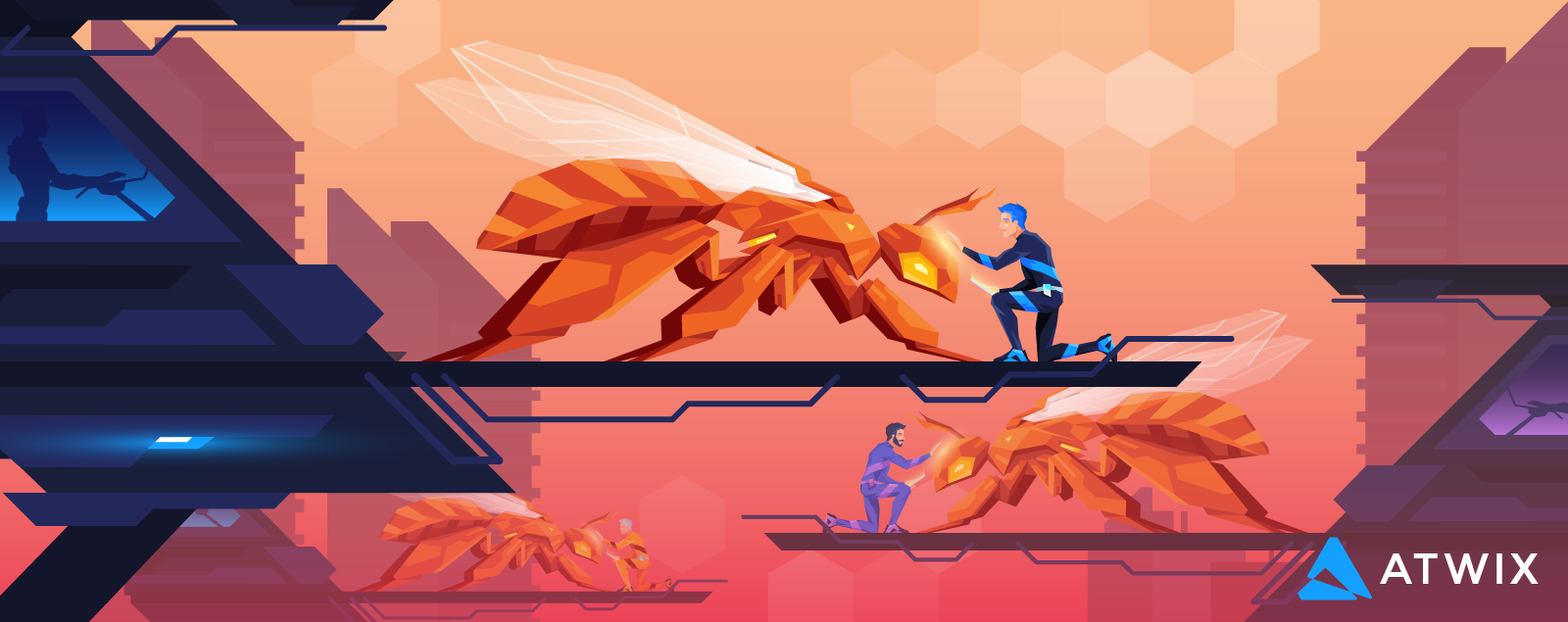The global B2B eCommerce market has reached unprecedented heights, with the worldwide business-to-business (B2B) e-commerce market worth an estimated $32.1 trillion in 2025, projecting growth to $62.2 trillion by 2030. This represents a 14.4% increase from 2024 to 2025, with projections indicating the market’s compound annual growth rate (CAGR) from 2025 to 2030 will average 14.5%. To put this in perspective, B2B eCommerce sales total $7.7 trillion, more than double the value of D2C ($3.8 trillion).
The transformation is unprecedented: by 2025, 80% of B2B sales interactions will happen through digital channels, compared to just 13% in 2019. This digital acceleration is driven by millennials now making up 73% of B2B buyers, bringing consumer-grade expectations to business transactions.
The Current State of B2B eCommerce
Market Size and Growth Projections
The U.S. B2B e-commerce market alone is worth an estimated $10.1 trillion in 2025, projected to grow to $11.4 trillion by 2030. Regional distribution shows:
- Asia-Pacific: $25.2 trillion (426% more than North America)
- North America: $4.79 trillion (14.9% of global market)
- Europe: $2.08 trillion (6.5% of global market)
Digital Transformation Acceleration
The share of B2B organizations’ revenue from digital channels has reached 56% in 2025, up from 32% in 2020. Key transformation drivers include:
- Buyer Expectations: 83% of B2B buyers prefer digital platforms, while 60% can make decisions based solely on digital content
- Content Consumption: B2B buyers consume 13 pieces of content during their purchasing journey, including 8 pieces from vendors and 5 from third parties
- Decision-Making Complexity: 38% of businesses had two to three stakeholders involved in purchasing decisions in 2023, increasing to 41% in 2024
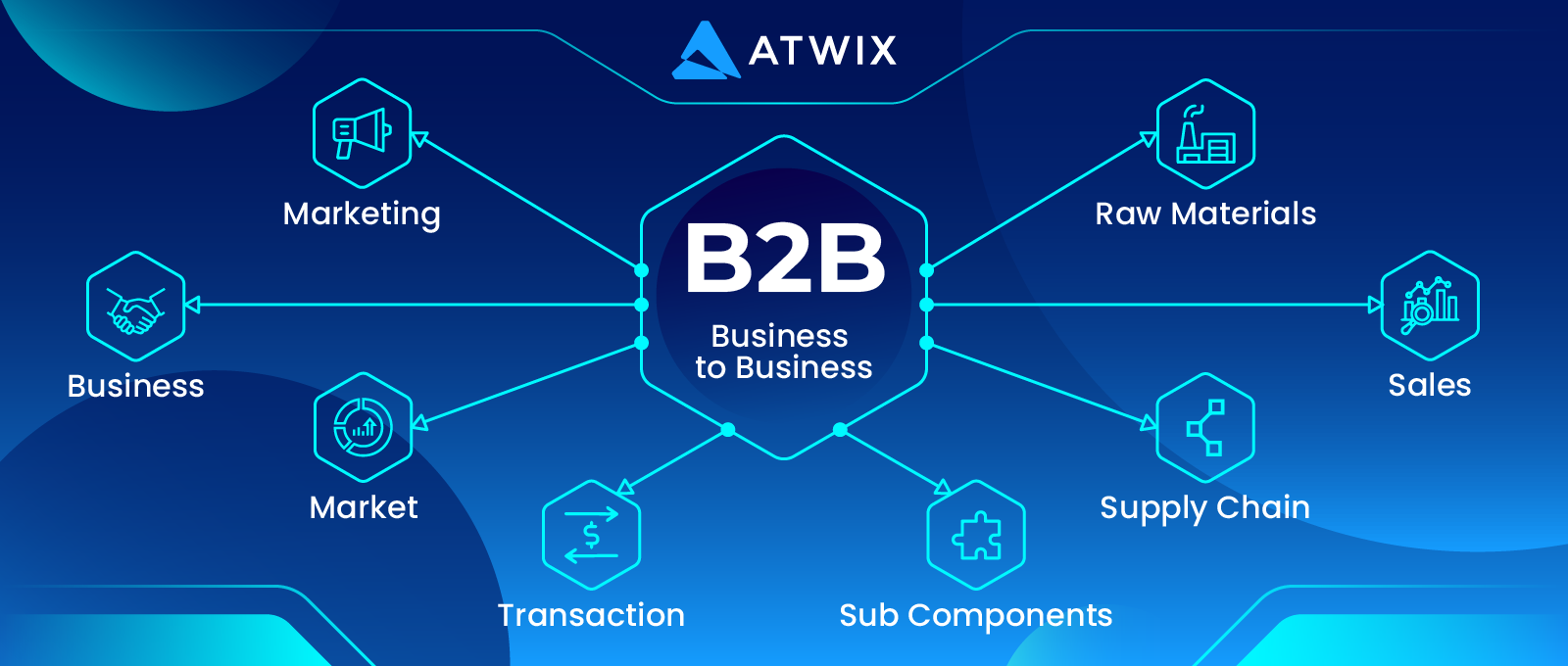
Atwix is a full-service eCommerce agency specializing in B2B platform development services. We power up digital transformation to overcome B2B selling challenges and deliver end-to-end implementations, design and development, performance optimization, maintenance, and support. Atwix helps clients of all sizes accomplish the impossible by providing exceptional outcomes in all aspects of their online B2B business.
This post will teach you the fundamentals of B2B eCommerce benefits, top platforms, and current industry trends. We will examine the factors contributing to success in B2B online business and introduce Atwix as a reliable B2B eCommerce partner. Our cases illustrate how we helped our clients overcome industry barriers and improve metrics across the board.
- The Basics of B2B eCommerce
- Top B2B eCommerce Platforms in 2025
- B2B eCommerce Trends in 2025
- Platform Selection Framework for 2025
- Implementation Success Strategies
- Industry Outlook and Future Predictions
- How to Succeed in B2B eCommerce?
- How Atwix Can Help You
- Ready to Transform Your B2B Operations in 2025?
The Basics of B2B eCommerce
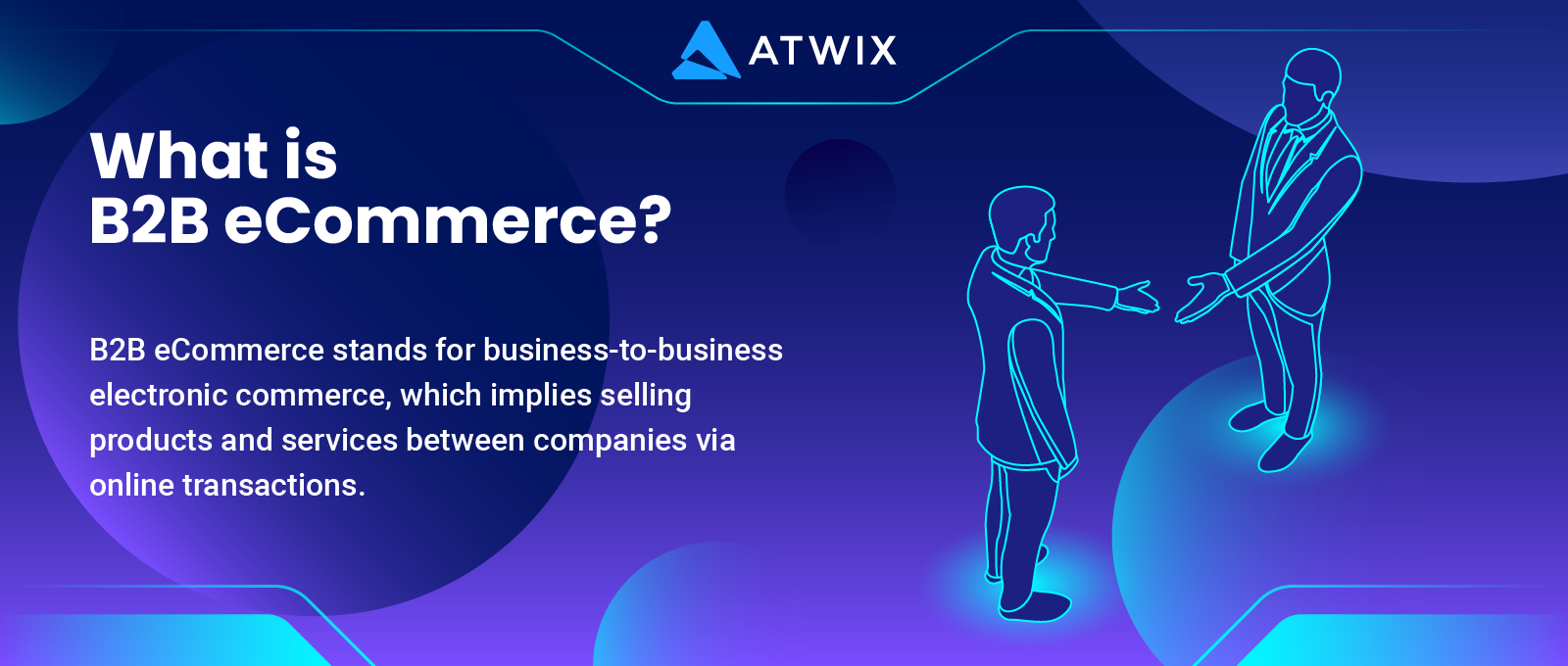
Let’s start with the definition of B2B eCommerce and then dig deeper into its types, marketing and sales strategies, and customer service.
What Is B2B eCommerce?
B2B eCommerce stands for business-to-business electronic commerce, involving the sale of products and services between companies through online transactions. Unlike B2C commerce, B2B transactions typically feature:
- High-value, low-volume sales
- Complex buyer hierarchies involving multiple decision-makers
- Longer sales cycles requiring extensive research and approval processes
- Custom pricing, bulk ordering, and negotiated terms
- Integration requirements with existing enterprise systems
Types of B2B eCommerce Models
The B2B eCommerce landscape encompasses several distinct models:
| Type | Primary Focus | Typical Clients |
|---|---|---|
| Wholesale Trade | Bulk transactions, discounted rates | Retailers, professional buyers |
| Manufacturers | Direct sales to businesses | Businesses needing raw materials or products for resale |
| Distributors and Suppliers | Intermediate goods distribution | Businesses across various industries |
| Business Services | Service solutions (e.g., SaaS, IT support) | Businesses seeking operational efficiency |
| Marketplaces | Online platforms connecting buyers and sellers | Buyers and sellers in specific industries or various sectors |
| Procurement and Supply Chain Management | Streamlining procurement processes | Businesses managing supply chains |
| Dropshipping | Selling without inventory, direct shipping from third party | Retailers and online stores without inventory |
| Direct to Consumer (D2C) by Manufacturers | Manufacturers selling directly to consumers | End consumers, alongside traditional B2B clients |
B2B2C
B2B2C (business-to-business-to-consumer) eCommerce eliminates traditional middlemen, bringing enterprises into direct contact with consumers. In 2025, this model has evolved with AI-powered personalization and omnichannel experiences that seamlessly blend B2B and B2C touchpoints. Amazon Business, which generated $35 billion in annualized sales in 2024, exemplifies this model’s potential.
Wholesalers
B2B wholesalers increasingly leverage AI-driven inventory management and predictive analytics to optimize bulk purchasing and pricing strategies. Digital transformation has moved beyond basic online catalogs to include real-time inventory synchronization, automated reordering systems, and customer-specific pricing engines.
Manufacturers
In 2025, manufacturers are adopting composable commerce architectures to support both traditional B2B sales and direct-to-consumer initiatives. 50% of manufacturers have prioritized eCommerce as a core element of their digital transformation strategies, integrating IoT data, predictive maintenance, and customization tools into their platforms.
Distributors
Modern distributors focus on omnichannel distribution strategies and marketplace integration. With Amazon Business and 36% planning to add six or more new countries to their sales reach, distributors must adopt increasingly sophisticated eCommerce technology to attract and retain customers globally.
B2B eCommerce Marketing and Sales Strategies
Before implementing marketing or sales techniques, determine your ideal customer profile using AI-powered buyer persona analysis. 89% of B2B buyers research online, and 75% use social media in buying decisions, making digital-first strategies essential.
Key 2025 B2B marketing and sales strategies include:
Content-Driven Education: 91% of B2B marketers use content marketing, with video delivering the best ROI for 52% of marketers. Provide AI-enhanced content experiences through interactive demos, personalized webinars, and dynamic case studies.
Social Commerce Integration: 46% of B2B buyers use social media to research solutions, with posting customer reviews on LinkedIn lifting conversions 5.3x. Establish thought leadership across relevant platforms with authentic engagement strategies.
AI-Powered Personalization: 66% of B2B buyers expect fully personalized experiences, with 87% willing to pay more for it. Implement real-time content customization, behavioral targeting, and predictive product recommendations.
SEO and Digital Visibility: 70% of B2B marketers say SEO drives more sales than PPC, with 95% of buyers not looking past the first page of Google. Focus on technical SEO, local search optimization, and content authority building.
Omnichannel Engagement: Create seamless experiences across digital touchpoints, sales teams, and physical locations. McKinsey reports hybrid sales can drive up to 50% more revenue.
B2B Customer Service
B2B customer service in 2025 focuses on AI-enhanced support experiences and proactive service delivery. 78% of senior executives expect to deliver growth using data and AI, making intelligent customer service a competitive necessity.
Modern B2B customer service best practices include:
- AI-Powered Proactive Service: Use predictive analytics to anticipate customer needs and resolve issues before they arise. Implement real-time order tracking, automated issue detection, and intelligent escalation workflows.
- Self-Service Optimization: 83% of B2B buyers prefer digital platforms for routine interactions. Invest in comprehensive knowledge bases, AI chatbots, interactive documentation, and personalized customer portals.
- Omnichannel Support Consistency: Ensure consistent experiences across all touchpoints with unified customer data platforms and integrated communication systems.
- Personalized Service Experiences: Use customer data to deliver tailored support interactions, role-specific assistance, and industry-relevant solutions.
- Post-Purchase Engagement: Maintain relationships through automated follow-up sequences, success metrics tracking, and expansion opportunity identification.
Top B2B eCommerce Platforms in 2025
When choosing a B2B eCommerce platform in 2025, consider AI capabilities, composable architecture, mobile optimization, integration flexibility, and total cost of ownership. Here are the leading platforms addressing specific B2B client needs and demands.
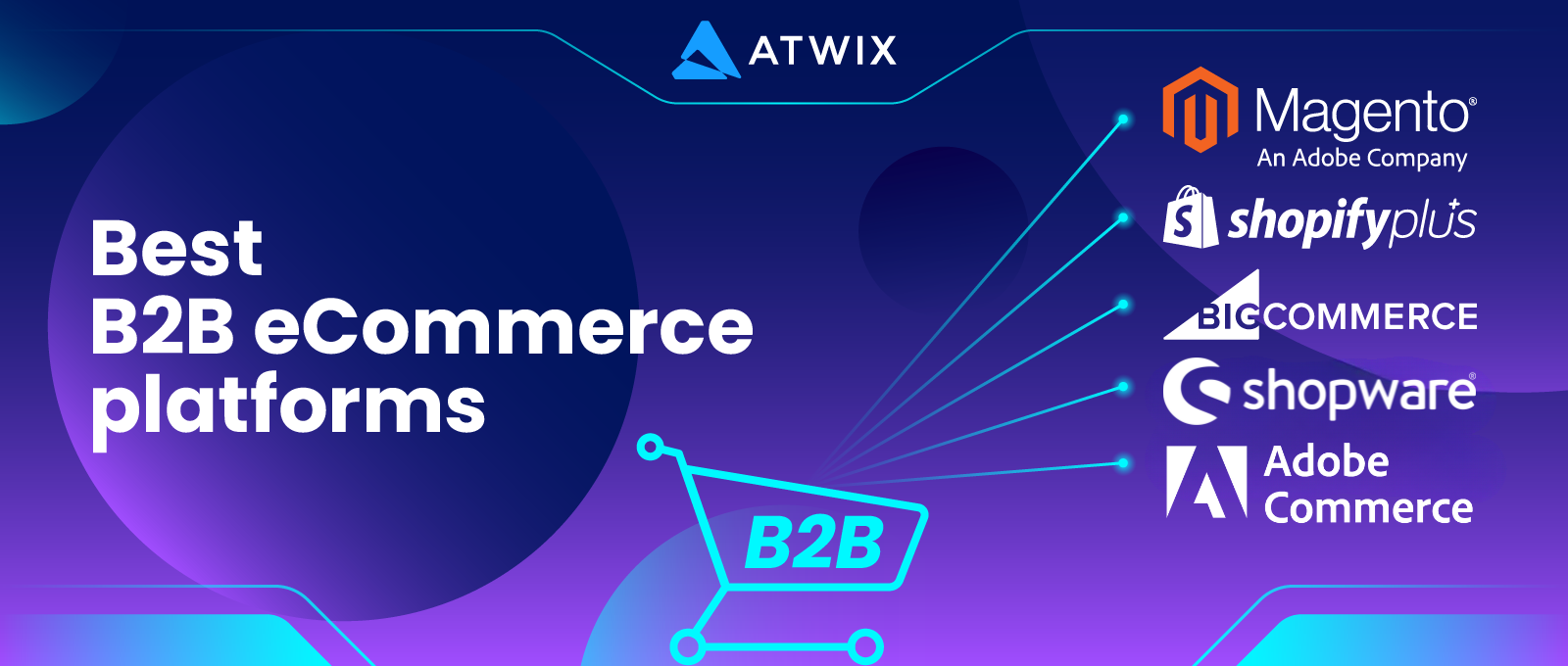
Adobe Commerce (Magento)
Adobe Commerce remains the enterprise leader, powering 130,000+ live storefronts and supporting $155 billion in annual GMV. The 2025 version brings significant AI enhancements and composable commerce capabilities.
Top 2025 Adobe Commerce B2B features include:
- AI-Powered Merchandising: Automated product recommendations with 13+ recommendation types
- Advanced Company Hierarchies: Multi-level organizational structures with role-based permissions
- GraphQL B2B API Coverage: Complete API support for quotes, requisitions, and company credit
- Real-Time Personalization: Customer-specific pricing, catalogs, and content delivery
- Mobile-First Architecture: PWA Studio with 50.8% mobile transaction support
- Composable Integration: API-first architecture supporting best-of-breed tools
- Enterprise Security: PCI Level 1 compliance with AI-powered threat detection
Pricing: $25-40k/year
Best For: Large enterprises requiring extensive customization, high-volume transactions (200k+ orders/hour), and deep Adobe ecosystem integration.
Shopify Plus
Shopify Plus has expanded its B2B capabilities while maintaining its reputation for rapid deployment and extensive app ecosystem. Over 7,000 B2B firms use Shopify Plus, though it faces limitations in native B2B functionality.
Shopify Plus 2025 B2B features:
- B2B Checkout Enhancements: Company-specific payment terms and wholesale pricing
- Marketplace Integration: Enhanced Amazon, Walmart, and social commerce connections
- Advanced Analytics: AI-driven insights and conversion optimization
- Global Expansion Tools: Multi-currency, multi-language, and tax compliance
- App Ecosystem: 8,000+ apps for specialized B2B functionality
- Mobile Optimization: Industry-leading mobile conversion rates
Pricing: Starting at $2,000/month (25% increase from previous pricing)
Best For: Mid-market businesses prioritizing speed-to-market, established app ecosystem integration, and hybrid B2C/B2B models.
BigCommerce
BigCommerce earned recognition in multiple 2025 industry reports for its native B2B features and no-transaction-fee model. The platform offers true omnichannel capabilities with multi-storefront management.
BigCommerce 2025 B2B highlights:
- Native B2B Features: Customer groups, price lists, and bulk ordering out-of-the-box
- Multi-Storefront Management: Manage multiple brands from single backend
- Headless Commerce Ready: API-first architecture with GraphQL support
- Advanced Search: AI-powered product discovery and filtering
- Global Commerce: Built-in multi-currency and tax management
- Mobile Optimization: Responsive design with Progressive Web App capabilities
Pricing:
- Standard: $39/month
- Plus: $105/month
- Pro: $399/month
- Enterprise: Custom pricing
Best For: Growing businesses seeking native B2B functionality, predictable pricing, and omnichannel growth without transaction fees.
Shopware
Shopware has emerged as a formidable B2B platform, earning 11 medals (6 gold) in the 2025 Paradigm B2B Midmarket Combine Report. Particularly strong in European markets with innovative AI integration.
Shopware 2025 B2B innovations:
- AI-Powered Commerce: Dynamic pricing, intelligent search, and automated content generation
- Advanced Product Catalogs: Customer-specific catalogs with personalized quote processes
- Budget Management: Team-based budget allocation and approval workflows
- Organization Units: Map complex B2B internal structures and hierarchies
- Agentic Commerce Alliance: Industry-leading AI-first commerce experiences
- Modular B2B Components: Flexible activation/deactivation of features
- European Compliance: Built-in GDPR compliance and regional optimization
Pricing:
- Community Edition: Free
- Rise: $600/month
- Evolve: $2,400/month
- Beyond: $6,500/month
Best For: Mid-market businesses seeking fast implementation, transparent pricing, built-in AI capabilities, and strong European market presence.
B2B eCommerce Trends in 2025
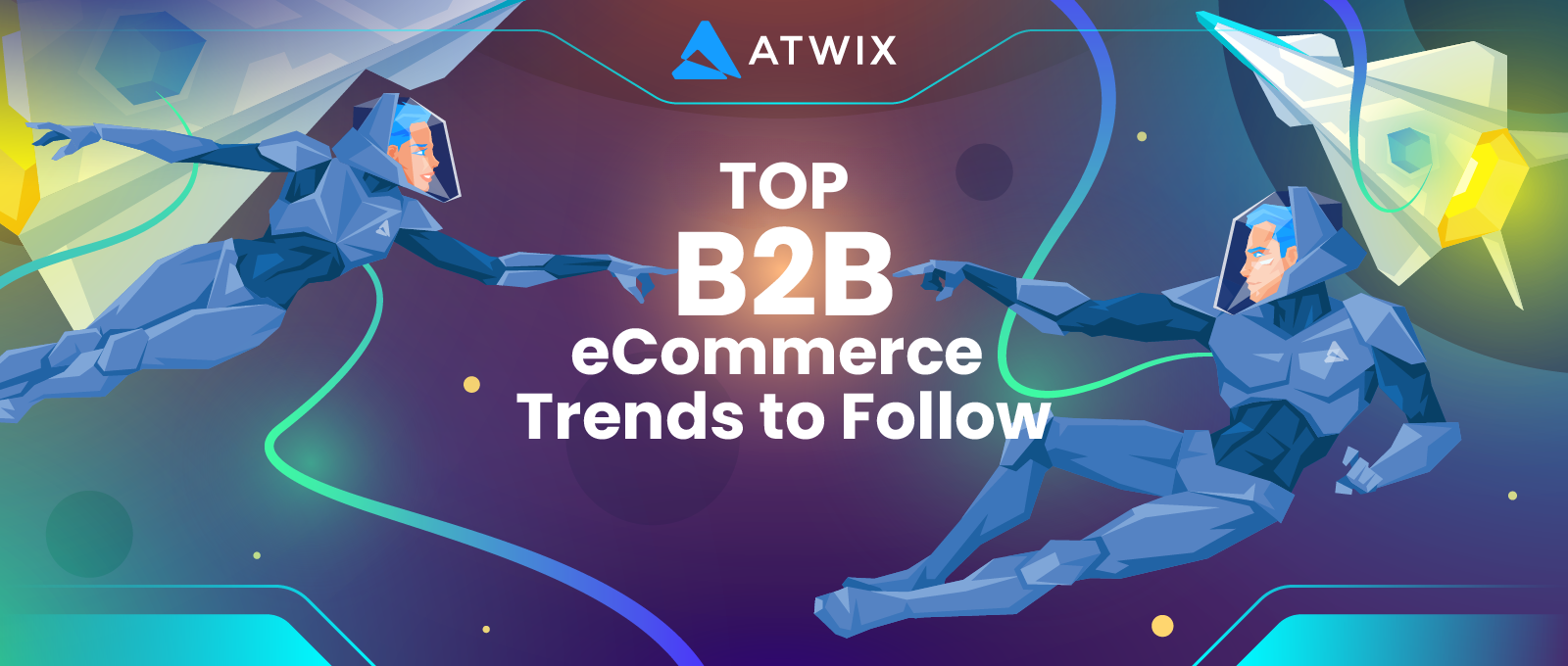
The B2B eCommerce landscape in 2025 is shaped by technological advancement, changing buyer expectations, and market dynamics. Here are the key trends influencing the sector:
AI-Powered Automation and Intelligence
81% of B2B companies invest in AI technology, with 79% committing to increased investment in 2025. AI applications have evolved beyond basic chatbots to comprehensive business intelligence.
Key AI implementations:
- Predictive Analytics: Demand forecasting, customer lifetime value prediction, and inventory optimization
- Dynamic Pricing: Real-time price optimization based on market conditions, customer behavior, and inventory levels
- Content Generation: Automated product descriptions, personalized marketing copy, and multilingual translations
- Process Automation: 95% reduction in manual entry through AI-powered order processing and approval workflows
Composable Commerce Revolution
72% of US retailers have implemented composable solutions, marking a fundamental shift toward flexible, API-first architectures. Composable commerce enables businesses to select and integrate best-of-breed solutions.
Composable advantages:
- Rapid Innovation: Deploy new features without platform limitations
- Cost Optimization: Pay only for needed functionality with modular pricing
- Integration Flexibility: Connect with existing ERP, CRM, and business systems
- Future-Proofing: Swap components without full platform migration
Self-Service and Buyer Empowerment
Modern B2B buyers expect consumer-grade self-service capabilities. 83% prefer digital platforms, while 60% can make purchase decisions based solely on digital content.
Essential self-service features:
- Real-Time Pricing: Customer-specific pricing with instant updates
- Automated Approvals: Configurable workflow automation for purchase orders
- Order Management: Reorder functionality, requisition lists, and bulk ordering
- Account Self-Management: User permissions, company hierarchies, and budget controls
Omnichannel Integration Excellence
Hybrid sales models can drive up to 50% more revenue by combining digital efficiency with human expertise. Successful B2B companies integrate all touchpoints seamlessly.
Omnichannel requirements:
- Unified Customer Data: Single view across all interactions and channels
- Consistent Experience: Seamless transitions between digital and human touchpoints
- Mobile Optimization: 50.8% of sales originate on smartphones with 3.7% conversion rates
- Sales Rep Tools: Digital tools that enhance rather than replace human relationships
Advanced Personalization at Scale
66% of B2B buyers expect fully personalized experiences, with many wanting higher personalization than in their personal lives. AI enables personalization previously impossible to achieve.
Personalization applications:
- Dynamic Content: Real-time content adaptation based on buyer behavior and preferences
- Product Recommendations: AI-powered suggestions with 13+ recommendation types
- Customer Journeys: Personalized paths through complex B2B buying processes
- Pricing Strategies: Individual pricing based on relationship, volume, and market conditions
Sustainability and Social Commerce
73% of buyers are willing to change consumption habits to reduce environmental impact. B2B buyers increasingly factor sustainability into purchasing decisions.
Sustainability initiatives:
- Carbon Impact Analytics: Built-in environmental impact measurement and reporting
- Sustainable Supply Chains: Transparency and optimization for eco-friendly operations
- Social Responsibility: Integration of ESG factors into purchasing workflows
- Circular Economy: Support for recycling, refurbishment, and sustainable practices
Social commerce evolution:
- LinkedIn Commerce: 5.3x conversion lift from customer reviews on professional networks
- Peer Recommendations: Referral programs and social proof integration
- Thought Leadership: Content marketing through social platforms for brand building
Platform Selection Framework for 2025
Comprehensive Platform Comparison
| Platform | Best For | Starting Price | Key Strengths | Implementation Time |
| Adobe Commerce | Large Enterprise | $25-40k/year | Advanced customization, Adobe ecosystem | 6-12 months |
| Shopify Plus | Rapid scaling | $2,000/month | Quick deployment, app ecosystem | 3-6 months |
| BigCommerce | Mid-market growth | $39/month | Native B2B features, no transaction fees | 2-4 months |
| Shopware | European/Global mid-market | $600/month | AI-powered tools, transparent pricing | 6-12 weeks |
| Oracle SuiteCommerce | NetSuite users | $2,500/month | ERP integration, unified operations | 4-8 months |
Decision Matrix
Choose Adobe Commerce if you need:
- Complex multi-brand, multi-storefront operations
- Extensive customization capabilities
- Deep Adobe Experience Cloud integration
- Proven high-volume transaction handling (200k+ orders/hour)
- Enterprise-grade security and compliance
Choose Shopify Plus if you need:
- Rapid market entry with established app ecosystem
- Strong D2C + B2B hybrid model
- Predictable monthly costs with transaction-based scaling
- Extensive third-party integrations
Choose BigCommerce if you need:
- True omnichannel capabilities without transaction fees
- Built-in B2B features without apps
- Multi-storefront management from single account
- Headless/API-first architecture
Choose Shopware if you need:
- Fast implementation with built-in AI capabilities
- Transparent, predictable European-style pricing
- Modular B2B components with flexible activation
- Strong GDPR compliance and European market focus
Choose Oracle SuiteCommerce if you need:
- Seamless NetSuite ERP integration
- Unified financial and commerce operations
- Mid-market B2B focus with comprehensive features
Implementation Success Strategies
Platform Selection Criteria for 2025
- Business Size and Complexity: Match platform capabilities to organizational scale and requirements
- Geographic Focus: Consider regional strengths (Shopware for Europe, Shopify Plus for North America)
- Integration Requirements: Evaluate existing ERP, CRM, and business system connectivity needs
- Implementation Timeline: Balance feature requirements with go-to-market urgency
- Total Cost of Ownership: Consider licensing, implementation, maintenance, and scaling costs
- AI and Automation Readiness: Assess built-in versus integrated AI capabilities
- Composable Architecture: Future-proof with API-first, headless-ready platforms
Digital Transformation Best Practices
Successful businesses in 2025 are implementing MVP (Minimum Viable Product) approaches with phased rollouts and continuous improvement rather than big-bang launches.
Implementation Strategy:
- Start with core functionality that delivers immediate value
- Gather real-world feedback from actual users and stakeholders
- Iterate and expand features based on performance data and user behavior
- Maintain focus on user experience throughout the transformation process
- Measure and optimize performance continuously with data-driven decisions
- Plan for composable growth with modular additions and integrations
Industry Outlook and Future Predictions
Market Growth Projections
The B2B eCommerce market valued at $32.1 trillion in 2025 is projected to reach $62.2 trillion by 2030, representing a 14.5% CAGR. Key growth drivers include:
- Digital-First Buyer Expectations: Millennials comprising 73% of B2B buyers
- AI and Automation Adoption: 81% of companies investing in AI technology
- Cross-Border Expansion: 44% of GMV from international transactions
- Mobile Commerce Growth: 50.8% of sales originating on smartphones
- Sustainability Requirements: ESG factors in procurement decisions
Technology Evolution Roadmap
Emerging Technologies for 2025-2026:
- Agentic Commerce: AI agents handling complex negotiations and approvals
- Blockchain Integration: Supply chain transparency and smart contracts
- IoT-Enabled Reordering: Automated inventory management and predictive ordering
- AR/VR Product Visualization: Enhanced product demos and virtual showrooms
- Voice Commerce: Voice-activated ordering and inventory management
Regulatory and Compliance Considerations
Key compliance requirements for 2025:
- Data Localization: Regional data storage requirements affecting platform architecture
- Privacy Regulations: GDPR, CCPA, and emerging privacy frameworks
- Cross-Border Trade: Evolving international commerce regulations
- Sustainability Reporting: ESG compliance and carbon impact measurement
- AI Governance: Emerging regulations for AI transparency and accountability
How to Succeed in B2B eCommerce?
Success in B2B eCommerce requires strategic alignment of technology, processes, and customer experience:
Strategic Priorities:
- Embrace AI and Automation: Leverage intelligent tools for competitive advantage
- Adopt Composable Architecture: Build flexible, scalable technology foundations
- Prioritize Mobile Experience: Optimize for mobile-first B2B buyers
- Implement Comprehensive Personalization: Deliver relevant, tailored experiences
- Focus on Integration Excellence: Connect all business systems seamlessly
- Invest in Data Analytics: Make decisions based on real-time insights
- Plan for Global Expansion: Build capabilities for international growth
Key Success Metrics:
- Customer Lifetime Value: Measure long-term relationship profitability
- Digital Adoption Rate: Track customer engagement with self-service tools
- Order Processing Efficiency: Monitor automation impact on operational costs
- Mobile Conversion Rates: Optimize mobile experience performance
- Integration Performance: Ensure seamless data flow between systems
Are you looking for the best B2B e-commerce solutions?
Reach out to Atwix and find out how your business can thrive

How Atwix Can Help You
Atwix is an experienced B2B development company with multi-platform expertise across Adobe Commerce, Shopware, BigCommerce, and emerging technologies. Since 2006, we have accelerated digital transformation to address evolving B2B sales challenges.
Our 2025 Capabilities:
Multi-Platform Excellence:
- Adobe Commerce Contributor Partner with deep enterprise experience
- Shopware Platinum Partner specializing in European market expansion
- BigCommerce Certified Partner for rapid mid-market deployment
- Platform-agnostic approach helping clients choose optimal solutions
Advanced Technology Integration:
- AI-Powered Implementation: Intelligent automation and personalization
- Composable Architecture Design: Future-proof, flexible technology stacks
- Mobile-First Development: Progressive web apps and responsive design
- Omnichannel Integration: Seamless customer experience across touchpoints
Let’s review cases demonstrating how we helped our clients overcome B2B eCommerce hurdles and improve KPIs.
Breaking Down eCommerce Barriers for Byrne
Our client, Byrne, has manufactured power and data solutions for various industries for over 50 years. Byrne was dissatisfied with their outdated technology and envisioned a specialized and unique gateway for B2B clients. Atwix fully revamped the front end of the client’s business model using Magento Commerce Cloud. The platform’s launch enabled the client to use its people better and invest and divert resources into product growth and innovation.
Magento Website Rebuild for Coastal Business Supplies
Coastal Business Supplies sells printers, vinyl, and paper to businesses. They tasked Atwix with redesigning their website to promote usability and friendliness. Atwix entirely rebuilt the client’s site, streamlining code, removing obstacles, and fine-tuning the engine, which now powers the client’s eCommerce activity. As a result, Coastal Business Supplies saw increased engagement, time spent on the site, user experience, and conversion KPIs.
Ready to Transform Your B2B Operations in 2025?
The B2B eCommerce landscape is evolving at unprecedented speed. 80% of B2B sales interactions will happen digitally by 2025, and businesses must adapt or risk falling behind.
Whether you need:
- Platform migration to modern, AI-powered solutions
- Integration optimization for seamless operations
- Mobile-first experiences for modern B2B buyers
- Composable architecture for future flexibility
- Global expansion capabilities
Atwix provides the expertise and proven track record to ensure your success.
Contact Atwix today to discuss the right B2B eCommerce solution for your 2025 goals and beyond.
